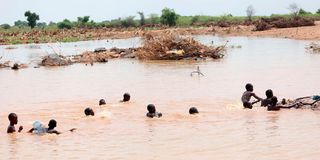Premium
How Muslim flood victims kept the faith during Ramadhan in IDP camps

Boys swimming in stagnant waters that brought by floods that cut off a section of the road at Madogo in Tana River County that leads to Garissa town on December 18, 2023.
What you need to know:
- Unlike other Muslims who wake up to the morning meals commonly known as ‘daku’, the survivors of floods in Garsen and Galole camps wake up to the harsh sun
- The little food they find has to be rationed to last another day as the earnings of the next day are not guaranteed
As Muslims worldwide enter the final days of the Ramadhan period, hundreds of Islamic families living in Internally Displaced Camps in Tana River county have not had it easy.
For the more than 300 families who were displaced from their homes by floods during last year’s rainy season, this has been the toughest Ramadhan ever.
After the floods robbed them of their food and sources of income, they have not had anything to look up to hence forced to adapt to new ways of earning a living.
Unlike other Muslims who wake up to the morning meals commonly known as ‘daku’, the survivors of floods in Garsen and Galole camps wake up to the harsh sun to trace where to find a hustle and hope that the day may end well with breaking of the fast and having an evening meal.
"The faith requires that we have both meals, but we are not at an advantage. Life here is a struggle and we must spend well what we earn in the day to sustain another day,” said Halima Barasa, a survivor at Watta Galole camp.
The little food they find has to be rationed to last another day as the earnings of the next day are not guaranteed.
Children above the age of five are forced to fast, the rest including the sick survive on porridge and breast milk.
"We have to work, we are either doing laundry for other people or we are helping with cleaning in hotels and food kiosks even the men have to find something to do, including jobs in construction sites," said Mohammed Omar, a survivor.
Each day of their lives is a struggle. Water scarcity and mosquito bites is their daily experience.
In the evening, they join tents for prayers, asking God for a better tomorrow, that a kind eye may see their plight and supply them with food items.
"We see trucks of food pass the road to other areas and just wish someone could remember us and ease our burdens for a few days, but it’s just a wish," said Hawaa Sawen.
With only a few days left to Eid-Ul-Fitr that will mark the end of fasting, towns are full of Muslim faithful shopping for foodstuff and new clothes for their families, a tradition that is common around this period.
But in the IDP camps, it’s a luxury not in mind of those whose only thoughts are for food to enable them live to see another day.
Chief Kadhi Abdulhalim Hussein said Muslims in Kenya can mark Eid-Ul-Fitr either on Wednesday or Thursday.
Various well-wishers have embarked on sharing food items with fellow faithfuls across the country, but the moment has not arrived yet for the survivors in camps.
While all eyes are set on the county administration for food aid, the department of special programs notes that there are no plans underway.
"At the moment we don’t have plans to distribute food ahead of the Eid, maybe later on," said Special Programs Chief Officer Salma Makuru.
On the other hand, the El-Niño resource mobilization committee that was appointed to look for aid for the survivors has since wound up their time.
Chairperson Fahim Bayusuf notes that all the funds gathered have been handed over to the county administration to facilitate procurement and distribution of food aid.
"We did our part as the team, and we can’t execute further because our term was three months and it has expired, unless the governor renews it, our hands are tied," he said.
The survivors have been forced to live at the camps after the county government warned residents against going back to flood-prone areas.





